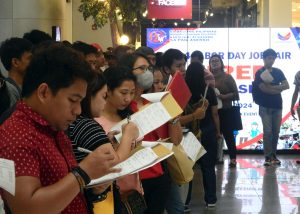The business sector, industry stakeholders and the academe signed a memorandum of Memorandum of Understanding (MOU) on the Regional Inclusive Innovation Center (RIIC).
The MOU was signed between the Davao City Chamber of Commerce and Industry (DCCCI) and key officials of the Department of Trade and Industry (DTI XI) Department of Science and Technology (DOST XI), Commission on Higher Education (CHED XI), Davao International Container Terminal (DICT), Mindanao Cluster 3, National Economic and Development Authority (NEDA XI), United States Agency for International Development – Science, Technology, Research and Innovation for Development (USAID-STRIDE), and the Food Processors Association in.
The MOU signing was witnessed by DTI Undersecretary Rafaelita Aldaba.
“This is a great help to spread out innovations to the entire region. Through innovation we can improve the productivity of our industries,” Aldaba said during the event at the Pinnacle Hotel on Wednesday.
“In this way, we can put our resources together. We will collect all the different innovation programs of government, the research investments that DOST is investing on, as well as the support of the DTI in terms of commercialization of research that help us come up with new products and new processes that would really make Davao achieve a much higher level of growth,” she added.
She also said the signing of the MOU, which will lead to the setting up of the RIIC, will pave the way for more inclusive and sustainable growth activities in the region.
The MOU signing was set to formalize the collaboration among government, industry, and academe stakeholders in pursuing innovation as strategy to industrial growth in Davao.
“The need to really innovate is propelled by the need to actually to improve the growth we are experiencing,” said John Carlo Tria, DCCCII president.
Tria said that through collaboration with the different stakeholders, the city will also be able to innovate its industries with the use of its resources.
The academe will also help to improve innovation especially in addressing the mismatch between
job opportunities and developed skills.
“We have high hopes that through this collaboration, through this project, gracefully, we are going to provide solutions to address the mismatch because we will be benefiting from the collaboration with our industry partners,” CHED XI Regional Director Maricar Casquejo said.
According to DTI, with the help of the USAID-STRIDE, the RIIC will focus more on processed fruits, nuts and functional food, with plans to expand to other sectors.
The RIIC is the cornerstone of the Philippine Inclusive Innovation and Industrial Strategy, which lies at the heart of of economic transformation and bridges the gap between the industry and academe.
It serves to create a virtual and physical regional innovation ecosystem made up of universities, research and development labs, science and technology parks, start-up incubators, fabrication laboratories, co-working spaces, investors, government agencies, start-up businesses, and micro, small and medium enterprises, DTI said.
The RIIC also harnesses the region’s thriving innovation ecosystem composed of government agencies, academic institutions, and dynamic industry players in developing innovative products and services for its focused sectors, DTI further explained.



